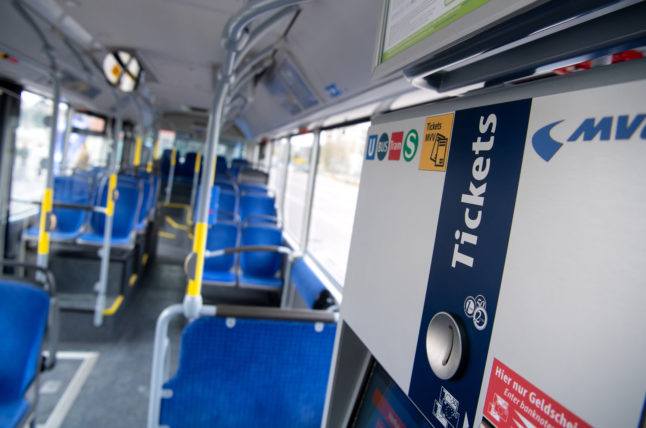An feud between the federal and state governments intensified on Monday as state leaders threatened to block the government’s most recent energy package when it is put to a vote in the Bundesrat on Friday.
The battle relates to the government’s plans for a budget transport ticket that would allow people to travel on local and regional transport around Germany for just €9 per month.
Though the 16 states have agreed to support the ticket, transport ministers are arguing that the low-cost option will blow a hole in their budgets and lead to potential price hikes once autumn rolls around.
They claim that current funding promised by the Federal Transport Ministry doesn’t go far enough.
READ ALSO:
- Why German politicians are bickering over the €9 transport ticket
- What tourists visiting Germany need to know about the €9 ticket
“If the federal government believes it can be applauded on the backs of the states for a three-month consolation prize and that others should foot the bill, then it has made a huge mistake,” Bavaria’s Transport Minister Christian Bernreiter (CSU) told Bild on Monday.
The government has pledged €2.5 billion to the states to pay for the measure, as well as financial support for income lost during the Covid crisis.
Transport Minister Volker Wissing. of the Free Democrats (FDP), said states would also receive the revenue of the €9 ticket from customers who take advantage of the offer.
“For this ‘9 for 90 ticket’, the €2.5 billion is a complete assumption of the costs by the federal government,” said Wissing on Thursday. “In addition, the states are also allowed to keep the €9 from the ticket price, so they are very well funded here.”

However, federal states want a further €1.5 billion in order to increase staff, deal with extra fuel costs and to plan for the expansion of local transport in Germany.
Mecklenburg-Western Pomerania’s Minister for Economic Affairs, Reinhard Meyer (SPD), told Bild that there would be “no approval (on Friday) as long as the federal government does not provide additional funds.”
Baden-Württemberg’s Transport Minister Winfried Hermann (Greens) also warned that “the entire package of fuel rebate and €9 euro ticket could fail in the Bundesrat” if the government doesn’t agree to the state’s demands on funding.
The Bundesrat is Germany’s upper house of parliament, which is comprised of MPs serving in the state governments. Unlike in the Bundestag, where the traffic-light coalition of the Social Democrats (SPD), Greens and Free Democrats (FDP) has a majority, the CDU is the largest party in the Bundesrat.
What is the €9 ticket?
The €9 monthly ticket was announced early this year as part of a package of energy relief measures for struggling households.
With the price of fuel rising dramatically amid supply bottlenecks and the war in Ukraine, the traffic-light coalition is hoping to encourage people to switch to public transport over summer instead.
The ticket will run for three months from the start of June to the end of August, and will allow people to travel nationwide on local and regional transport. Long-distance trains like IC, EC and ICE trains will not be covered by the ticket.
It should be available to purchase from May 23rd, primarily via ticket offices and the DB app and website.
Some regional operators, including Berlin-Brandenburg’s VBB, have also pledged to offer the ticket at ticket machines.
READ ALSO: EXPLAINED: How to get hold of the €9 travel ticket in Berlin



 Please whitelist us to continue reading.
Please whitelist us to continue reading.
Typical